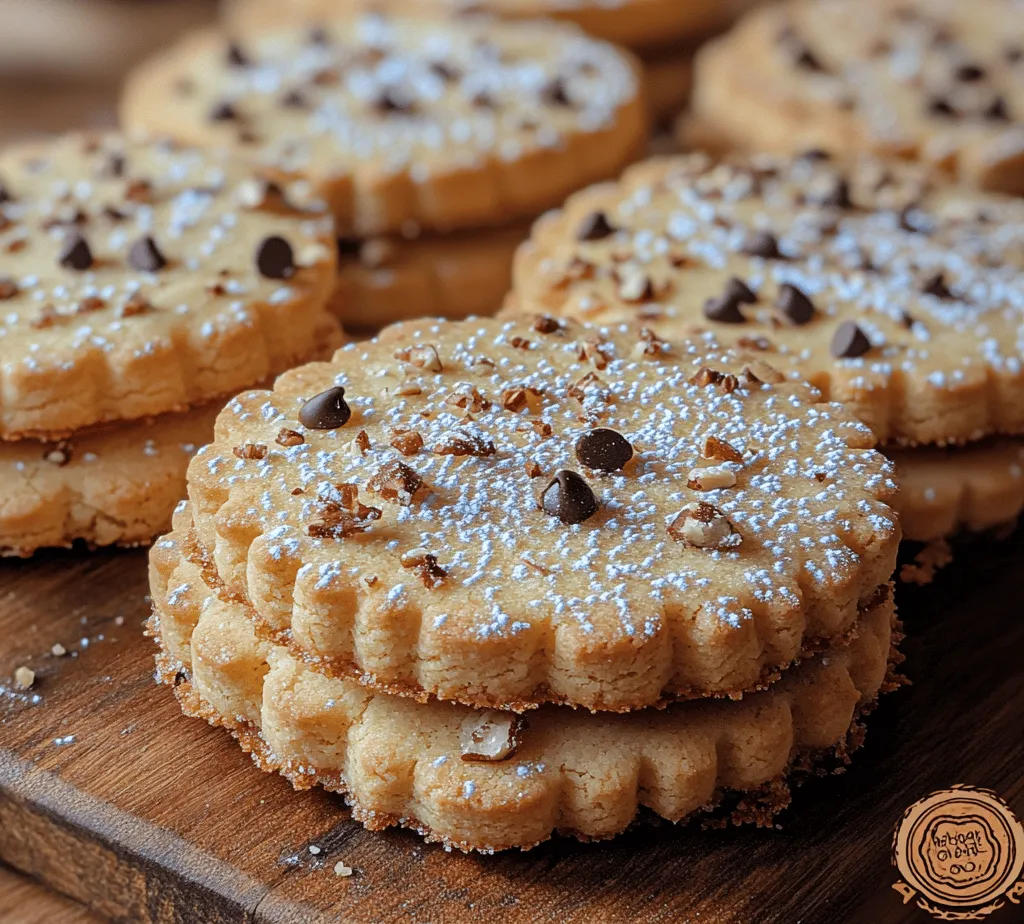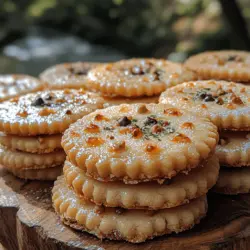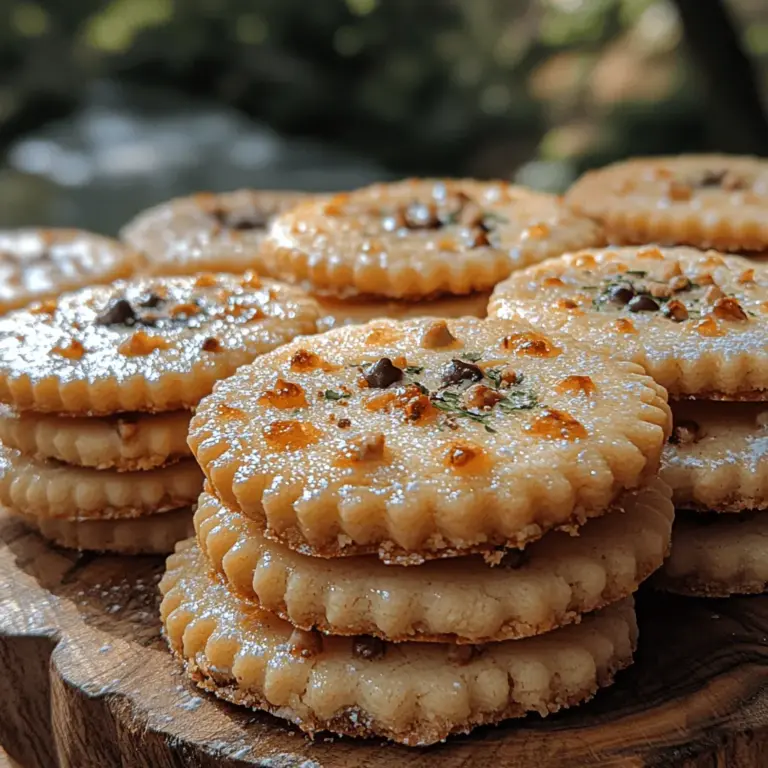Introduction
Shortbread cookies, with their rich buttery flavor and delicate crumb, have earned a cherished place in the hearts of cookie lovers around the world. Originating from Scotland, these delightful treats are synonymous with indulgence and simplicity. Perfect for tea time, celebrations, or just a sweet snack, shortbread cookies stand out for their buttery goodness and melt-in-your-mouth texture.
In this guide, we’ll explore the art of making Delicious Buttery Bliss Shortbread Cookies. What sets these cookies apart is their unique ability to deliver an incredibly rich flavor while remaining beautifully tender. Made with just a handful of classic ingredients, this recipe invites bakers of all levels to create a cookie that is both timeless and satisfying. Whether you’re an experienced baker or a novice in the kitchen, you’ll appreciate the straightforward nature of this recipe, which allows the quality of each ingredient to shine through.
Get ready to embark on a culinary adventure that will fill your kitchen with the warm scent of freshly baked cookies, and delight your taste buds with each blissful bite.
Understanding Shortbread Cookies
Shortbread cookies have a storied history that dates back to the 16th century. Derived from the old Scottish biscuit known as “biscuit bread”—which was made from leftover bread dough—shortbread evolved into the beloved treat we know today. This transformation was largely thanks to the introduction of sugar and butter, which provided the sweetness and richness that characterize modern shortbread.
The classic formula for shortbread is deceptively simple, typically consisting of just three primary ingredients: butter, sugar, and flour. The ratios of these ingredients can vary, leading to a myriad of variations, but the fundamental principle remains the same: the cookie should be rich and crumbly, creating a delightful melt-in-the-mouth experience. Some recipes incorporate cornstarch or rice flour to enhance the texture further, making the cookies even more tender.
Butter is the star of the show in any shortbread recipe. It is essential not only for flavor but also for creating the perfect texture. The quality and temperature of the butter can significantly impact the outcome of your cookies. For the best results, using unsalted butter at room temperature allows for optimal creaming with sugar, resulting in a light and airy mixture that will contribute to the cookie’s overall texture.
As we delve into the world of shortbread, it’s crucial to understand how each ingredient plays a role in crafting the perfect cookie, from the richness of butter to the sweetness of powdered sugar.
Ingredients Breakdown
Unsalted Butter
When it comes to making shortbread cookies, the type of butter you use is critical. Unsalted butter is the preferred choice because it allows you to control the saltiness of the dish. For this recipe, using butter at room temperature is key. Room temperature butter is easier to cream with sugar, leading to a smoother and airier cookie batter. This step is vital as it helps incorporate air into the mixture, resulting in a light and tender cookie.
Powdered Sugar
Powdered sugar, also known as confectioners’ sugar, plays a significant role in achieving the desired texture of shortbread cookies. Unlike granulated sugar, powdered sugar contains cornstarch, which helps prevent clumping and creates a finer, smoother texture. When creamed with butter, it contributes to the cookie’s tender crumb, enhancing its melt-in-your-mouth quality. The sweetness level is also perfectly balanced, ensuring that the cookies are not overly sweet.
Pure Vanilla Extract
Vanilla extract is an essential ingredient that elevates the flavor profile of your cookies. It adds depth and complexity, enhancing the overall taste without overpowering the buttery richness. When selecting vanilla, opt for pure vanilla extract rather than imitation, as the flavor difference is significant. A touch of vanilla can transform your cookies from ordinary to extraordinary, making each bite a delightful experience.
All-Purpose Flour
All-purpose flour is the backbone of the cookie dough, providing the necessary structure. It gives the cookies their form while allowing them to remain tender. The key to achieving the perfect texture lies in the proper handling of the flour; overmixing can lead to tough cookies. For the best results, gently incorporate the flour until just combined to ensure the cookies remain light and crumbly.
Salt
While it may seem counterintuitive to add salt to a sweet cookie recipe, a small amount is crucial for balancing flavors. Salt enhances the natural sweetness of the sugar and the richness of the butter, bringing harmony to the cookie’s overall taste. It’s a subtle yet vital ingredient that should not be overlooked.
Cornstarch
Cornstarch is an optional but valuable addition to shortbread cookie recipes. It helps create an ultra-tender texture, making the cookies even more delicate. By replacing a portion of the flour with cornstarch, you can achieve a melt-in-your-mouth quality that is characteristic of the best shortbread. If you choose to include cornstarch, it will contribute to a lighter, more crumbly cookie.
Optional Ingredients: Chocolate Chips or Nuts
While traditional shortbread cookies are delicious on their own, there’s always room for creativity. Consider adding chocolate chips, nuts, or even dried fruit to personalize your cookies. Chocolate chips can introduce a delightful contrast to the buttery flavor, while nuts add a satisfying crunch. Feel free to experiment with different mix-ins to tailor the cookies to your liking.
Step-by-Step Instructions for Blissful Shortbread Cookies
Preheating the Oven
Before you begin the process of making your Delicious Buttery Bliss Shortbread Cookies, the first step is to preheat your oven. Proper temperature control is essential for baking success; an oven that is too hot can result in cookies that spread too much, while an oven that is too cool can yield cookies that are dense and undercooked. Set your oven to 350°F (175°C) to ensure that your cookies bake evenly and achieve that perfect golden color.
Creaming the Butter and Sugar
The next crucial step in creating your shortbread cookies is the creaming of the butter and powdered sugar. Start by placing the room temperature unsalted butter in a mixing bowl. Using an electric mixer or a hand whisk, beat the butter until it becomes smooth and creamy. This process usually takes about 2-3 minutes.
Once the butter is creamy, gradually add the powdered sugar while continuing to mix. Beat the mixture until it is light and fluffy, which should take another 2-3 minutes. The goal is to incorporate air into the mixture, which will help your cookies rise and create a tender texture.
As you cream the butter and sugar together, take a moment to enjoy the rich, buttery aroma that fills the kitchen—this is the foundation of your delicious cookies. After achieving the desired consistency, you can move on to the next steps, knowing that you’ve set the stage for a delightful batch of shortbread cookies.
—
In the following sections, we will continue exploring the remaining steps required to complete your Delicious Buttery Bliss Shortbread Cookies, ensuring that you have all the knowledge needed to create these treats that are sure to become a family favorite.

Incorporating Vanilla: Ensuring Even Distribution for Maximum Flavor
To elevate the flavor profile of your buttery bliss shortbread cookies, incorporating vanilla is essential. Begin by measuring out high-quality vanilla extract. The aromatic notes of vanilla complement the rich butter, creating a delightful balance. Add the vanilla extract to the creamed butter and sugar mixture, ensuring it is evenly distributed. This step is crucial, as it enhances the overall flavor without overwhelming the buttery essence of the cookies. Stir gently but thoroughly to achieve uniform incorporation, which will lead to a more flavorful cookie.
Preparing the Dry Ingredients: The Significance of Proper Mixing and Its Effect on Texture
Next, focus on the dry ingredients. In a separate bowl, whisk together all-purpose flour, cornstarch, and a pinch of salt. This step is not merely a formality; it plays a critical role in achieving the perfect texture. The cornstarch helps to create a tender crumb, while the salt enhances the sweetness of the cookies. Whisking these ingredients ensures that the cornstarch and salt are evenly distributed throughout the flour, preventing pockets of salt or cornstarch from forming in the dough. Aim for a light and airy mixture, which will contribute to the melt-in-your-mouth quality of the finished cookies.
Combining Wet and Dry Mixtures: Tips for Avoiding Overmixing and Developing Gluten
Once your wet and dry mixtures are prepared, it’s time to combine them. Gradually add the dry ingredients to the wet mixture, folding the ingredients together with a spatula or wooden spoon. It’s vital to avoid overmixing at this stage. Overmixing can lead to gluten development, resulting in tough cookies instead of the desired crumbly texture. Mix just until the dry ingredients are barely incorporated, and you see no visible flour. The dough should be slightly crumbly but cohesive enough to hold together when shaped.
Shaping the Dough: Techniques for Creating Uniform Logs and the Chilling Process
Now that your dough is ready, it’s time to shape it. Turn the dough out onto a clean surface and gather it into a ball. Divide the dough into two equal portions for easier handling. Roll each portion into a log about 1.5 inches in diameter. Uniformity is key; this ensures all cookies bake evenly. Once shaped, wrap the logs tightly in plastic wrap and refrigerate for at least one hour. Chilling the dough is essential, as it allows the butter to firm up, preventing the cookies from spreading too much during baking.
Slicing the Cookies: Best Practices for Achieving Even Thickness for Baking Consistency
After the dough has chilled and firmed up, it’s time to slice the cookies. Using a sharp knife, slice the logs into rounds about 1/4 inch thick. For best results, use a gentle sawing motion rather than pressing down hard, which can distort the shape. Aim for uniform thickness in each slice to ensure consistent baking. Place the sliced cookies on a parchment-lined baking sheet, leaving space between each piece to allow for slight expansion.
Baking Process: Key Indicators for Perfect Baking and Avoiding Overcooking
Preheat your oven to 350°F (175°C) before placing the cookies inside. Bake the shortbread cookies for 12 to 15 minutes or until the edges are lightly golden. Keep an eye on them, as baking times may vary depending on your oven. The key indicators for perfect baking include a firm texture and a pale golden bottom; the tops should remain light in color. Avoid overcooking, as this can lead to a dry texture. If you’re unsure, it’s better to err on the side of underbaking slightly, as the cookies will continue to firm up as they cool.
Cooling and Storage: How to Properly Cool Cookies to Maintain Texture and Flavor
Once baked, remove the cookies from the oven and allow them to cool on the baking sheet for about 5 minutes. This resting time is crucial, as it prevents them from crumbling when you transfer them to a cooling rack. After they’ve set slightly, use a spatula to move the cookies to a wire rack to cool completely. Proper cooling helps to maintain their texture and ensures they don’t become soggy. Store the cooled cookies in an airtight container at room temperature for up to a week, or freeze them for longer storage.
Baking Tips for Perfect Shortbread Cookies
To achieve the best results with your buttery bliss shortbread cookies, consider the following baking tips:
1. Ingredient Temperatures and Measurements: Ensure your butter is at room temperature for easy creaming with sugar. Accurate measurements are vital; use a kitchen scale for precise weight if possible.
2. Common Mistakes to Avoid: Avoid using cold butter, as it won’t cream properly, leading to dense cookies. Also, resist the temptation to skip the chilling step; it’s crucial for achieving the right texture.
3. Flavor Variations: Experiment with different flavors by adding citrus zest, almond extract, or finely chopped herbs like rosemary. You can also fold in chocolate chips or dried fruit for a delightful twist.
Serving Suggestions and Pairings
Shortbread cookies offer versatility in serving and presentation. Here are some delightful ways to enjoy them:
– Tea Pairings: Serve your shortbread cookies alongside a warm cup of tea. Their buttery flavor complements various teas, especially Earl Grey or chamomile.
– Dessert Platters: Incorporate shortbread into dessert platters. Pair them with fresh fruits, cheese, or chocolate for a sophisticated touch.
– Creative Presentations: For special occasions, consider stacking the cookies in decorative tins or jars. Tie them with a ribbon for an elegant gift or party favor.
Nutritional Information
Understanding the nutritional aspects of your shortbread cookies can help you make informed choices. A typical serving size is one cookie, which contains approximately 100 calories. The primary ingredients—butter, flour, and sugar—contribute to the calorie count, while the cookies provide minimal fiber and protein. To create a healthier version, consider reducing the sugar or substituting part of the butter with applesauce or nut butter.
Conclusion
Baking buttery bliss shortbread cookies is a rewarding experience that combines simplicity with delightful results. The process is straightforward, allowing both novice and experienced bakers to enjoy the art of cookie making. As you experiment with flavors and variations, remember to relish the journey of creating these delicious treats. Sharing your homemade cookies with family and friends fosters connection and creates lasting memories. So, roll up your sleeves, gather your ingredients, and immerse yourself in the joy of baking. Indulge in the rich, buttery goodness of your shortbread cookies, and let them bring warmth and happiness to your home.

